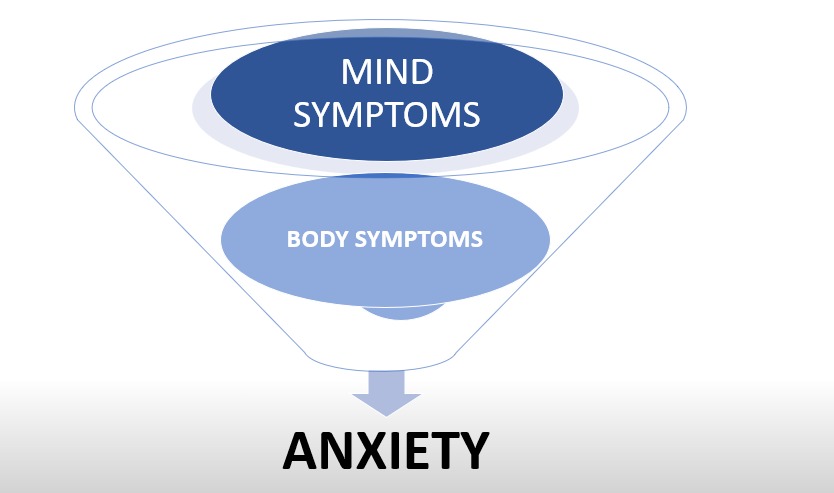Fear Vs Anxiety?
Commonly we interchange use of these words but its not the same. From talking to our friends, colleagues to venting it in social media we use these words interchangeably. But do we mean it right ?
- Fear is a natural part of the human makeup, which is protective of life and limb. Fear is a quality that is shared by all higher animals, as a protective mechanism to anticipate and react to danger.
- Fear is focused on known external danger, Anxiety is a generalized response to an unknown threat or internal conflict.
- Anxiety is a diffuse, unpleasant, vague sense of apprehension.
Consider this situation….
1) Imagine yourself walking down a dark street all alone in the middle of a night…
- Your uneasiness in this situation would be caused by anxiety related to the possibilityof something bad happening, such as being harmed by a stranger, rather than an immediate threat.
- This anxiety stems from your mind’s interpretation of the possible dangers.

2) You are now passing through a tunnel and someone points a knife at you and says, “This is a robbery,” …..then you’d likely experience a fear response.

Example 1 is typical of Anxiety response
Example 2 is Fear response
- When one feels fear, the body undergoes several near-instantaneous physical reactions designed to help escape from danger. The heart starts to race, breathing becomes shallower and faster, and one might jump or flinch.
- This instantaneous physical response is one important difference when it comes to fear vs anxiety as this instantaneous response happens with fear!
- Anxiety is a type of fear that are usually to do with the thought of a threat or something going wrong in the future, rather than right now.
- While anxiety and fear feel similar, anxiety is a reaction to emotions instead of danger in the environment.
FEELING ANXIOUS vs ANXIETY ‘ DISORDER’?
Do I have an anxiety disorder?
- It’s normal to be anxious in certain situations, but if you have feelings of anxiety over a long period of time and in inappropriate situations (long after the situation or problem has been resolved) it may be a sign of anxiety disorder.
- In Anxiety disorder, anxiety often comes up unexpectedly, for no apparent reason. Their anxiety response to a given trigger is much stronger than they would expect
- Anxiety may feel impossible to control or manage, and you may begin to avoid specific places or actions that often cause anxiety.
How Do I Know if I Have an Anxiety Disorder?
- May persist long after the trigger is removed or arise with no trigger at all.
- You might find it difficult to carry on daily activities
- Developing unhealthy behaviorsas a way to avoid what causes you anxiety
- Persistently avoiding situations which evokes anxiety
RELATED ANXIETY DISORDER
- Specific phobias
- Agoraphobia
- Social anxiety disorder
- Panic disorder
- Separation anxiety disorder
Other conditions such as post-traumatic stress disorder (PTSD) and obsessive-compulsive disorder (OCD) can also cause feelings of anxiety.

When we say ‘Anxiety’ we think it has to do with the mind! But Anxiety can produce symptoms in the body which can mimic a “general health problem”
Often we go to physician, he runs adequate investigations and at times he says everything is ‘normal’, but we would still continue to experience body complaints. One possible reason could be Anxiety!!
BODILY SYMPTOMS OF ANXIETY?
- Chest pain
- Cold chills or hot flushes
- Depersonalization and derealization
- Excessive sweating
- Dizziness
- Headaches
- Muscle pain and tension
- Numbness or tingling
- Ringing or pulsing in ears
- Shakingand trembling
- Shortness of breath
- Sleep disturbances
- Tightness felt throughout the body, especially in the head, neck, jaw, and face
- Upset stomach or nausea
How to treat anxiety?
TREAT THE MIND? TREAT THE BRAIN ?
- Scientists believed that a brain area, called the amygdala, served as the hub of anxiety.
- Studieshave shown that monkeys with impaired amygdala were unusually stoic in the face of scary stimulus (like a nearby snake). So we can understand that inappropriate fear and anxiety could be caused by a hyperactive amygdala—a simple cause and effect!
- Today, though, we appreciate that anxiety is the result of constant chatter between a number of different brain regions which we term as fear network. Interactions between brain areas are all important for how we experience anxiety.
- Two parts of this fear network : a cognitive brain and an emotional brain.
- The frontal lobe, where all of our sensations and thoughts come together as one unified experience, is the cognitive brain.
The amygdala, located deep inside the brain, is part of the emotional brain.
- Accordingly, we feel anxiety when signals from the emotional brain overpower the cognitive brain, and into our consciousness.
- E.g: Imagine yourself to be hiking, and suddenly you see something like a snake crawling but actually its nothing, Amygdala fires up and sends fear signal.
- But when you rationalize that snakes are rare in the woods you’re hiking in (using the cognitive brain), then cognitive brain network overtakes and tames the emotional fear network and you start feeling relaxed!
What if we could have these ‘faulty’ circuits and every excessive anxiety we feel is because of that?
So we should understand we alone are not completely responsible for the anxiety!
And so am not readily asking you to start taking medications for changing the brain circuit but the stigma should go off that anxiety is NOT self created….
